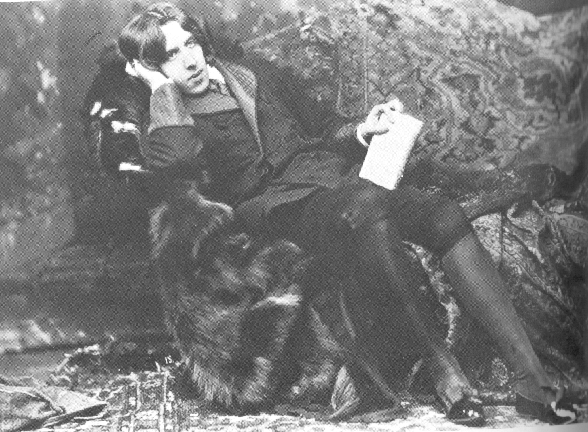
Wilde's Wild Life
(1854-1900)
-
Son of Anglo-Irish surgeon who attends Trinity College Dublin
and Oxford (known for eccentric style)
-
Founder of the Aesthetic Movement (art for art's sake)
-
Successful lecturer (in the US and UK)
-
Novelist: Dorian Gray
-
Dramatist: A Woman of No
Importance, An Ideal Husband,Salomé (in French)
-
Involved with Lord Alfred Douglas
-
In 1895 (year Earnest performed),
he sued Douglas' father the Marquis of Queensbury for libel (for being
called a "sodomite," a criminal offence); after dropped libel suit, he
is arrested, tried and found guilty for homosexuality.
-
Spends 2 years in prison doing hard labor.
-
Released in 1897, he lives in exile on the Continent as
Sebastian Melmoth, gets baptized in the Catholic Church, and dies of
cerebral meningitis in Paris.
19th-century Theater in
the Late 20th Century
-
In her 1990 study Sexual
Anarchy: Gender and Culture at the Fin de Siecle, Elaine
Showalter notes,
"The 1980s and 1990s - - - compulsively tell and retell the stories of
the 1880s and 1890s, in contemporary versions of Victorian novels, in
film and TV adaptations, in ballets and musicals, and in all the myriad
forms of popular culture .... Yet in retelling these stories we
transmit our own narratives, construct our own case histories, and
shape our own futures" (18).
-
1790s / 1890s / 1990s: Revolution, Bohemianism, Sexual
Experimentation
-
Growth of the City as Center for Cultural Shifts
Revolution in Leisure
after 1830
-
technology (train): more demand for seaside resorts
-
technology (steam press): pulp fiction and periodicals (see Punch)
-
technology (bicycle)
-
the pub
-
the football pitch
-
public parks and gardens
-
expansion of theaters
-
Music Halls
Victorian Theater
1) Genre
-
Melodrama: Plays with music using stock characters (villain,
heroine) that appealed to lower classes
-
Burlesque: the variety show
-
Middle-class Satire: Gilbert and Sullivan's operettas (cf. Patience)
-
Pantomime / Performance as Still Tableau
-
Tragedy: Reserved mostly for the "licensed" playhouses
2) Realities of
-
Often loud, crowded, and unruly
-
All plays had to be cleared by censors (parts of Wilde's play
not allowed)
-
Producing a play depended on a writer's affinity with the
ruling theatrical establishment
3) 1890s Outside Britain: the Naturalist Drama
-
Henrik Ibsen: A Doll's House, Hedda Gabler, Ghosts; Gerhart
Hauptmann: Before Sunrise, The
Weavers; Plays that subtly (and more oftentimes not so subtly)
critique the hypocrisy of modern life by comparing it to the struggle
of the fittest using minimalist scenery
Bunbury
according to OED:
The name of an imaginary person used as a fictitious excuse for
visiting a place or avoiding obligations (see quot. 1899). Hence used
allusively in various formations (see quots.).
1899 WILDE Importance of being Earnest I. 14, I have Bunburyed all
over Shropshire on two separate occasions. Ibid. 16, I have invented an
invaluable permanent invalid called Bunbury, in order that I may be
able to go down into the country whenever I choose. Ibid. 17 Now that I
know you to be a confirmed Bunburyist I naturally want to talk to you
about Bunburying.
1959 Listener 12 Feb. 300/3 He may even be able to kill the faint hope
in many hearts that the former has merely gone Bunburying.
1960 Times 27 Apr. 10/1 The perils of Bunburying to use the classical
term for the creation of a spurious alibi increase in proportion
to the complexity of the story told.
1965 P. MOYES Johnny under Ground
ix. 117 I've evolved this rather attractive alter ego Mr. Reginald
Derbyshire-Bentinck. Quite Bunburyish, in his own little way.
1969 Listener 5 June 794/3 For he who lives more lives than one More
deaths than one must die... At least the words are an apt motto for a
Bunburyist.
______________________________________________
Dandy according to OED:
One who studies above everything to dress elegantly and fashionably; a
beau, fop, ‘exquisite’.
c1780 Sc. Song (see N. & Q. 8th Ser. IV. 81), I've heard
my granny crack O' sixty twa years back When there were sic a stock of
Dandies O; Oh they gaed to Kirk and Fair, Wi' their ribbons round their
hair, And their stumpie drugget coats, quite the Dandy O. 1788 R.
GALLOWAY Poems (Jam.), They..laugh at ilka dandy at that fair day. 1818
MOORE Fudge Fam. Paris i. 48 They've made him a Dandy, A thing, you
know, whiskered, great-coated, and laced, Like an hour~glass,
exceedingly small in the waist. 1819 ANDERSON Cumbrld. Ball. (1823)
148, I..went owre to see Carel Fair; I'd heard monie teales o' thur
dandiesOdswinge! how they mek the fwok stare! 1831 CARLYLE Sart. Res.
III. x, A Dandy is a Clothes-wearing Man, a Man whose trade, office,
and existence consists in the wearing of Clothes. 1874 G. W. DASENT
Half a Life II. 65 Like the cabriolets which some dandies still drive.
Discussion
1. What is Bunburying? How might it relate to
sexuality (femininity, masculinity, etc.)?
2. What is the “importance of being earnest”? How does it relate to
“Englishness”?
3. What is the view of marriage portrayed in the play by Cecily and
Gwendolen, on the one hand, and Jack/Ernest and Algernon on the other?
How does it relate to class?
4. How does Wilde’s view of family compare to Ibsen and Strindberg’s?
5. What is meant by the term “modern” used in the play?
6. What character embodies Wilde’s voice? What does the doubling
in the play say about individuality?

